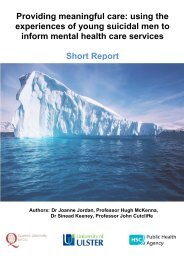Saving Mothers' Lives: - Public Health Agency for Northern Ireland
Saving Mothers' Lives: - Public Health Agency for Northern Ireland
Saving Mothers' Lives: - Public Health Agency for Northern Ireland
You also want an ePaper? Increase the reach of your titles
YUMPU automatically turns print PDFs into web optimized ePapers that Google loves.
152<br />
12 Deaths from psychiatric causes<br />
Margaret Oates<br />
New to this Enquiry 2003-05:<br />
Psychiatric deaths: Specifi c recommendations<br />
All professionals involved in caring <strong>for</strong> pregnant women who have been referred to child protection<br />
services should be alert to the fact that many of these women actively avoid maternity care despite<br />
being at high risk of medical or mental health problems. This risk is compounded by child protection case<br />
conferences and the removal of infants into care. Whilst the needs of the child must remain paramount,<br />
extra support and vigilance is needed <strong>for</strong> the mother and communication between all agencies involved<br />
in her care is essential. Further ef<strong>for</strong>ts are required to retain women who are substance misusers in<br />
treatment programmes after their child has been removed. Social workers should liaise with, and refer<br />
pregnant women in their care to, the local maternity services if necessary.<br />
Extra vigilance and support is required <strong>for</strong> women who have requested a termination but, because of late<br />
gestation or other reasons, have to continue with an unwanted pregnancy. All women, but particularly<br />
the most vulnerable and excluded who have little money and a lack of transport, should have easy<br />
access to local facilities. Careful consideration should also be given to the method employed as medical<br />
terminations are particularly distressing <strong>for</strong> women who are home alone.<br />
As in previous Reports:<br />
All women should be routinely asked in early pregnancy about current and previous mental health problems<br />
including their use of prescribed and non-prescribed medicine and legal and illegal substances including<br />
tobacco and alcohol. Maternity staff should sensitively, but explicitly, enquire into the nature and severity of<br />
these problems. They should check with the woman’s General Practitioner (GP) <strong>for</strong> further in<strong>for</strong>mation.<br />
During pregnancy, all women who are at identifi ed risk of serious postnatal mental illness should be<br />
assessed by a psychiatric team. The woman should have a management plan which includes a system<br />
of close supervision following birth. Midwives should check on the continuing mental health of all their<br />
clients at least twice during pregnancy and following delivery.<br />
Midwives should routinely in<strong>for</strong>m the GP that their patient is pregnant and ask <strong>for</strong> any health or relevant<br />
social in<strong>for</strong>mation. The responsibility of conveying previous psychiatric and medical history should not<br />
rest with the woman alone.<br />
GPs should communicate not only with obstetricians, but also with midwives, details of their patient’s<br />
previous psychiatric history including that of alcohol and drug misuse.<br />
Psychiatric teams caring <strong>for</strong> women with serious mental illness, particularly bipolar disorder, should<br />
proactively discuss with all female patients of childbearing age the risks associated with childbirth and<br />
plans to manage this risk should they become pregnant.<br />
Psychiatric teams should liaise with midwives and obstetricians about the management of pregnant<br />
women with mental health problems. Psychiatric teams should accept direct referrals from midwives.<br />
The training programmes of midwives, general practitioners, obstetricians and psychiatrists should<br />
include perinatal psychiatric disorders.<br />
Specialist perinatal psychiatric teams should be available to every maternity network or Trust to assist<br />
in the management of women who are at risk of becoming ill and to those who are suffering from<br />
serious postpartum disorders.



